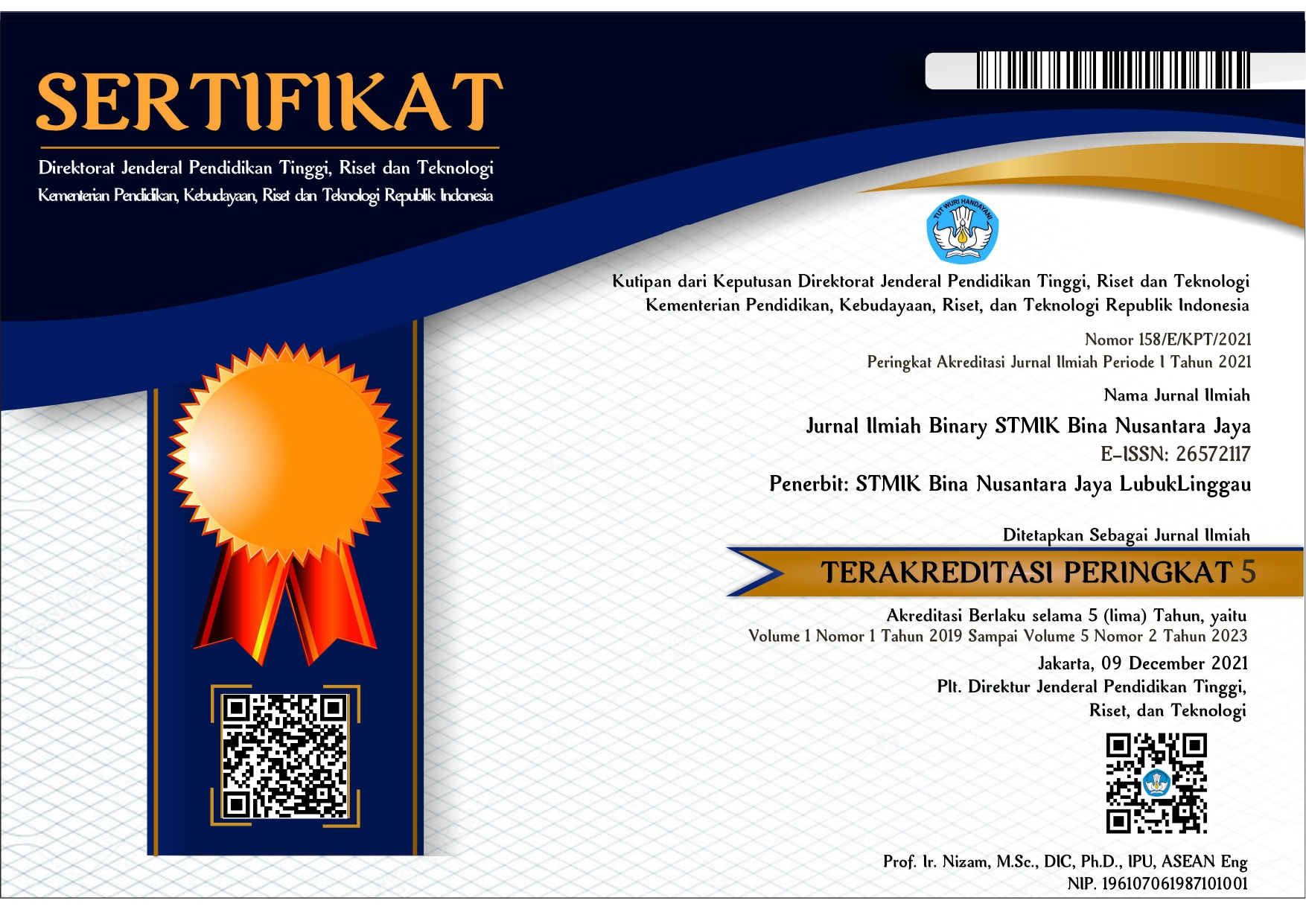Analisis Sentimen Program Makan Bergizi Gratis Siswa SMAN 01 Manokwari dengan Naïve Bayes
Studi Kasus Siswa SMAN 01 Manokwari Menggunakan Metode Naïve Bayes
Abstract
Abstract
The research aims to analyze the sentiment of students at SMAN 01 Manokwari toward the effectiveness of the Nutritious Meal Program (MBG), using one of the classification methods, namely the Naïve Bayes method. A total of 252 data points were analyzed, originating from student opinions that had undergone manual labeling into three sentiment categories: positive, neutral, and negative. The data distribution showed that 74.2% of the comments were positive, 15.1% neutral, and 10.7% negative. The data was then split into 80% training data and 20% test data. Before classification, feature extraction was performed using the TF-IDF method.
The classification results showed that the Naïve Bayes algorithm was able to classify the data with a fairly high accuracy of 86.27%. The highest precision was obtained in the positive class at 0.92. Likewise, the highest recall was also achieved in the positive class at 0.97. The highest F1-Score was also obtained in the positive class, reaching 0.95, and the AUC value reached 0.98, which falls into the category of excellent classification. Based on these results, it can be concluded that the majority of students gave positive responses to the Free Nutritious Meal Program, and the Naïve Bayes method is quite effective for sentiment analysis of student opinion data.
Abstrak
Penelitian bertujuan untuk menganalisis sentimen pada siswa SMAN 01 Manokwari terhadap efektivitas Program Makan Bergizi (MBG) pada siswa, dengan menggunakan salah satu metode klasifikasi yaitu metode Naïve Bayes. Jumlah Data yang telah dianalisis sebanyak 252 yang berasal dari pendapat para siswa yang telah melalui proses pelabelan manual menjadi tiga kategori sentimen, yaitu positif, netral, dan negatif. Distribusi pada data menunjukkan 74,2% komentar ber sentimen positif, 15,1% netral, dan 10,7% negatif. Data kemudian dibagi menjadi 80% data latih dan 20% data uji sebelum dilakukan pengekstrakan fitur pada data, maka fitur menggunakan metode TF-IDF. Hasil dari klasifikasikasi menunjukkan bahwa algoritma Naïve Bayes dapat mengklasifikasikan data dengan akurasi yang cukup besar 86,27%. Precision tertinggi yang telah diperoleh pada kelas positif sebesar 0,92. Sedangkan untuk recall tertinggi juga diperoleh pada kelas positif sebesar 0,97. Nilai F1-Score tertinggi juga didapatkan oleh data positif yang mana untuk kelas positif mencapai 0,95 dan nilai AUC sebesar 0,98 yang termasuk dalam kategori excellent classification. Berdasarkan hasil tersebut, dapat disimpulkan bahwa sebagian besar siswa memberikan tanggapan positif terhadap program Makan Bergizi Gratis, dan metode Naïve Bayes cukup efektif digunakan dalam analisis sentimen data pada pendapat siswa.
References
M. Ali, R. Johnson, L. Smith, dan T. Nguyen, "Nutritional Interventions in Children and Their Impact on Academic Performance," Journal of School Health, vol. 92, no. 4, pp. 215–222, Apr. 2022, doi: 10.1111/josh.13121.
J. F. W. Cohen, A. A. Hecht, G. M. McLoughlin, L. Turner, dan M. B. Schwartz, "Impact of Universal Free School Meals on Student Dietary Quality and Academic Performance: A Systematic Review," Public Health Nutrition, vol. 24, no. 5, pp. 1152–1165, Mar. 2021, doi: 10.1017/S1368980020005044.
T. Cover dan P. Hart, "Nearest Neighbor Pattern Classification," IEEE Transactions on Information Theory, vol. 13, no. 1, pp. 21–27, Jan. 1967, doi: 10.1109/TIT.1967.1053964
S. Hartati dan L. Kusumawardani, "Sentiment Analysis of COVID-19 Vaccine using Naïve Bayes Algorithm," Procedia Computer Science, vol. 179, pp. 705–712, 2021, doi: 10.1016/j.procs.2021.01.060.
E. M. A. Ernamia dan A. Herliana, "Analisis Sentimen Kuliah Daring dengan Algoritma Naïve Bayes, K-NN dan Decision Tree," Jurnal Responsif: Riset Sains dan Informatika, vol. 4, no. 1, hlm. 70–80, Feb. 2022.
J. C. Parnham, C. Millett, dan E. P. Vamos, "School meals in the UK: ultra-processed, unequal and inadequate," Public Health Nutrition, vol. 26, no. 1, pp. 297–301, Oct. 2022, doi: 10.1017/S1368980022002336.
J. R. Quinlan, "Improved Use of Continuous Attributes in C4.5," Journal of Artificial Intelligence Research, vol. 4, pp. 77–90, 1996, doi: 10.1613/jair.279.
J. D. Rennie, L. Shih, J. Teevan, dan D. R. Karger, "Tackling the poor assumptions of Naive Bayes text classifiers," dalam Proceedings of the 20th International Conference on Machine Learning (ICML 2003), Washington, DC, USA, 2003, pp. 616–623.
Z. Kastrati, F. Dalipi, A. S. Imran, K. Pireva Nuci, dan M. A. Wani, "Sentiment Analysis of Students’ Feedback with NLP and Deep Learning: A Systematic Mapping Study," IEEE Access, vol. 9, pp. 15242–15269, 2021, doi: 10.1109/ACCESS.2021.3056689.
B. Gunawan, H. S. Pratiwi, dan E. E. Pratama, "Sistem Analisis Sentimen pada Ulasan Produk Menggunakan Metode Naïve Bayes," Jurnal Edukasi Dan Penelitian Informatika (JEPIN), vol. 4, no. 2, pp. 113–120, 2018, doi: 10.26418/jp.v4i2.27526.
A. Indriani, "Analisa Perbandingan Metode Naïve Bayes Classifier Dan K-Nearest Neighbor Terhadap Klasifikasi Data," Sebatik, vol. 24, no. 1, pp. 1–7, 2020, doi: 10.46984/sebatik.v24i1.909.
V. R. Prasetyo, H. Lazuardi, A. A. Mulyono, dan C. Lauw, "Penerapan Aplikasi RapidMiner Untuk Prediksi Nilai Tukar Rupiah Terhadap US Dollar Dengan Metode Linear Regression," Jurnal Nasional Teknologi Dan Sistem Informasi, vol. 7, no. 1, pp. 8–17, 2021, doi: 10.25077/teknosi.v7i1.2021.8-17.
B. Budiman, R. Nursyanti, R. Y. R. Alamsyah, dan I. Akbar, "Data Mining Implementation Using Naïve Bayes Algorithm and Decision Tree J48 In Determining Concentration Selection," Jurnal XYZ, vol. 1, no. 3, pp. [halaman], 2020.
Fitri, "Analisis Sentimen Terhadap Aplikasi Ruangguru Menggunakan Algoritma Naïve Bayes, Random Forest Dan Support Vector Machine," Jurnal Transformatika, vol. 18, no. 1, pp. 71–81, 2020, doi: 10.26623/transformatika.v18i1.23.
Z. S. Anggraeni, B. Budiman, C. Habibi, dan N. Alamsyah, "Analisis Sentimen Publik Media Sosial Twitter Terhadap Tiket.com Menggunakan Algoritma Klasifikasi," Jurnal Informatika, vol. 11, no. 1, pp. 3–4, 2024.
Agam, P. M., Ranius, M. I. A., Sutabri, T., & Ranius, A. Y. (2023). Sentiment Analysis pada Review Pengguna Aplikasi Snapchat dengan Vader dan Algoritma Machine Learning. Jurnal Ilmiah Binary STMIK Bina Nusantara Jaya, 5(2), 94-97. DOI: 10.52303/jb.v5i2.1











